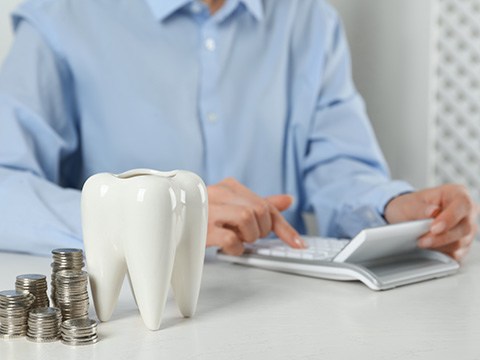Emergency Dentist— Downers Grove, IL
Toothache? Dental Pain? Call Us!
As bad as typical oral issues are, urgent ones are even worse. These latter kinds – “dental emergencies” – threaten your smile if you don’t treat them quickly. The good news is that Dentique Dental has just the solution for these incidents: emergency dentistry in Downers Grove! With this field and its procedures, Dr. Shuaipaj will promptly get your smile back on track. Learn more about it and how it works by reading below, or book a same-day visit now.
Why Choose Dentique Dental for Emergency Dentistry?
- Same-Day Emergency Appointments Available
- Dentist With Over 25 Years of Experience
- Sedation Dentistry for Calmer Care
How We Treat Dental Emergencies

While a dental emergency may seem scary, don’t let yourself panic. Our office will gladly walk you through how we’ll treat the problem. To that end, here are four things you should expect:
- A Same-Day Visit – Our team will set your visit for the earliest time possible when you call us. Depending on the situation, we may even see you the same day! Our team can also provide care tips over the phone, helping you manage while you wait for your appointment.
- An Emergency Exam – When you first see us, Dr. Shuaipaj will give you an oral exam. This assessment should confirm the source of your problem and how to relieve your pain.
- Findings Review – We’ll share our findings with you after the exam, as well as suggest relevant procedures. Our team will then draft a treatment plan using your feedback, though we’ll explain the relevant cost(s) and time before you commit.
- Proper Dental Care – Once your treatment plan is ready, you can trust us to fix your smile quickly. Our team is skilled and resourceful enough to do that job well. As a result, we’ll be ready to repair your grin with dental crowns, fillings, root canals, or whatever else you need.
The Most Common Dental Emergencies
Just to be clear, your first response to a dental emergency should be to call our office. We’ll set an appointment in a short time and solve your urgent problem. That said, you can take steps to handle your emergency while you wait; you’d then get smoother care. It’s just a matter of practicing the right tips and tricks! So, learn the relevant steps by clicking the icons below and using their advice.
Understanding the Cost of Dental Emergencies

In reality, the cost of dental emergencies varies from patient to patient. Different urgent oral issues demand different procedures, so treating them can involve high or low prices. That means you should see Dr. Shuaipaj for an exact estimate; he can narrow down the final expense. Once you have, our team will work to make your emergency care more affordable and budget-friendly. We’ll even explain your treatment’s cost factors, the role of dental insurance, and helpful payment options.
How to Prevent Dental Emergencies

If you want to prevent dental emergencies, there are things you can do to make them less likely. These include:
- Practice Good Oral Hygiene – If you brush and floss consistently, your smile will stay strong and better resist tooth decay, gum disease, and similar problems.
- Avoid Bad Oral Habits – Biting down on hard objects (ice, fingernails, pens, etc.) could chip or crack your teeth. The same applies if you use your teeth to open packages.
- Use a Mouthguard – Whenever you play a physical sport, wear a protective sportsguard to avoid dental injuries.
- Get Regular Dental Care –By seeing your dentist for six-month checkups and cleanings, you’ll prevent small oral issues from becoming emergencies.
Dental Emergency FAQs
What Does Throbbing Tooth Pain Mean?
Abnormal symptoms, like throbbing tooth pain, are often the result of an untreated oral health issue. So, don’t wait – schedule an emergency exam with Dr. Xhelo. Once he learns about your symptoms, takes a look at your X-rays, and examines your tooth, he will share his findings as well as his treatment recommendations. Then, you’ll work on your custom treatment plan together, and he will begin the process of restoring your healthy, pain-free smile!
Will a Toothache Go Away on Its Own?
Oftentimes, patients try the “wait and see” approach with toothaches. However, this only gives the root of the problem more time to progress. There may come a time when your discomfort subsides, but that’s actually bad news; it means the infection has “killed” the nerve. That’s why we strongly recommend scheduling an appointment with us right away. If you don’t, then we may only have one option by the time you do come in: an extraction.
How Should I Sleep with Tooth Pain?
If your appointment with us isn’t until the following morning, we have some good news: there are several easy steps you can take to alleviate your symptoms in the short-term. The first is eating nutrient-dense, easy-to-chew foods at dinner, like oatmeal and plain yogurt. The second is taking an OTC pain reliever about 30 minutes before bed. The third is propping yourself up on a few pillows so your head stays elevated throughout the night.
Should I Visit the Emergency Room First for Dental Emergencies?
If you’re experiencing potentially life-threatening symptoms, like uncontrollable bleeding, then you should absolutely call 911 or head to the ER. If you aren’t, then you shouldn’t go to the hospital; they rarely have dentists on-staff. Instead, if you’re located in Downers Grove, we recommend giving us a call! We offer morning, lunchtime, and weekend appointments, so you can turn to us for help when you need it most.
Should I Worry About a Chipped Tooth If It Doesn’t Hurt?
If you aren’t in pain, and the chip is small, then you don’t have to worry about scheduling a same-day appointment. That said, you should still visit us before the end of the week. That way, we can make sure that the tooth doesn’t develop an infection, that your enamel doesn’t break further, and that the soft tissue in your mouth isn’t cut on the sharp edge.
What If I Can’t Afford Emergency Dentistry?
If you’re worried about receiving an unexpected bill, don’t worry – we’ll provide you with an estimate of the cost upfront. Plus, we will review the details of the financial solutions we offer, including dental insurance and our very own membership plan. That way, you can focus on getting the care you need instead of stressing about the price.
I Need a Checkup & Cleaning I Want to Enhance My Smile I am Scared of the Dentist I Have a Cavity or Broken Tooth I am Missing One or More Teeth I Want a Straighter Smile I am Worried about Gum Disease View Our Services

